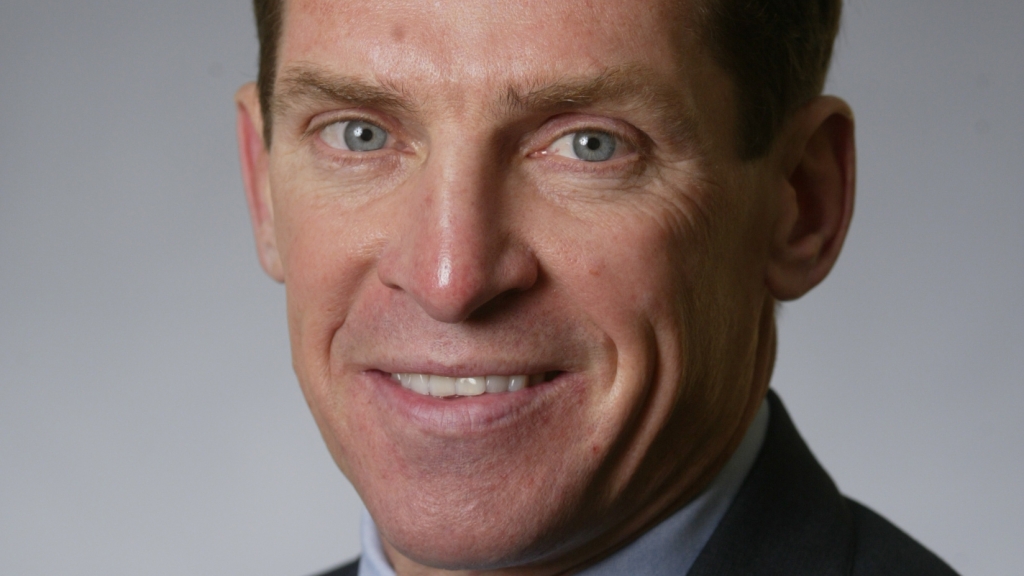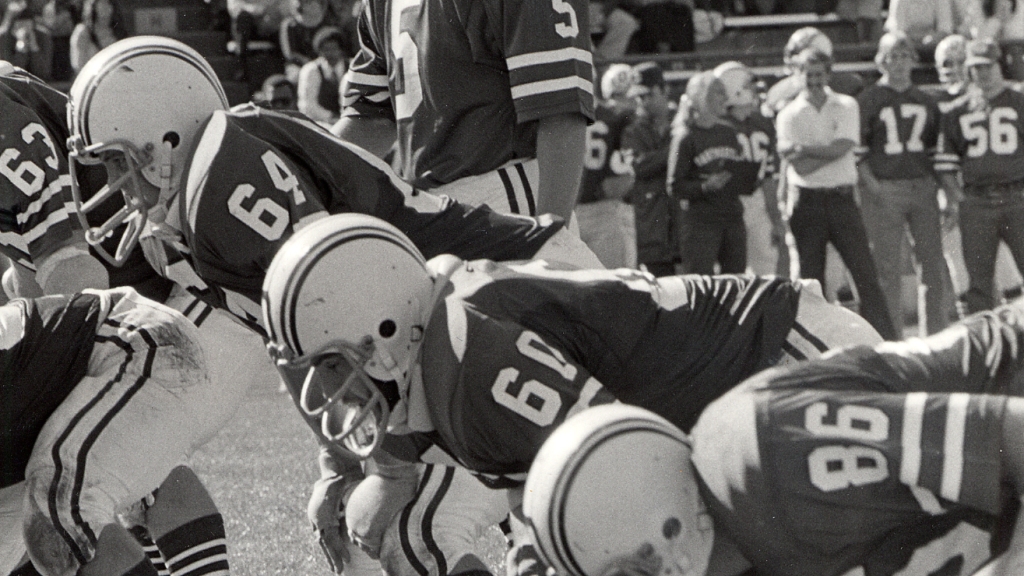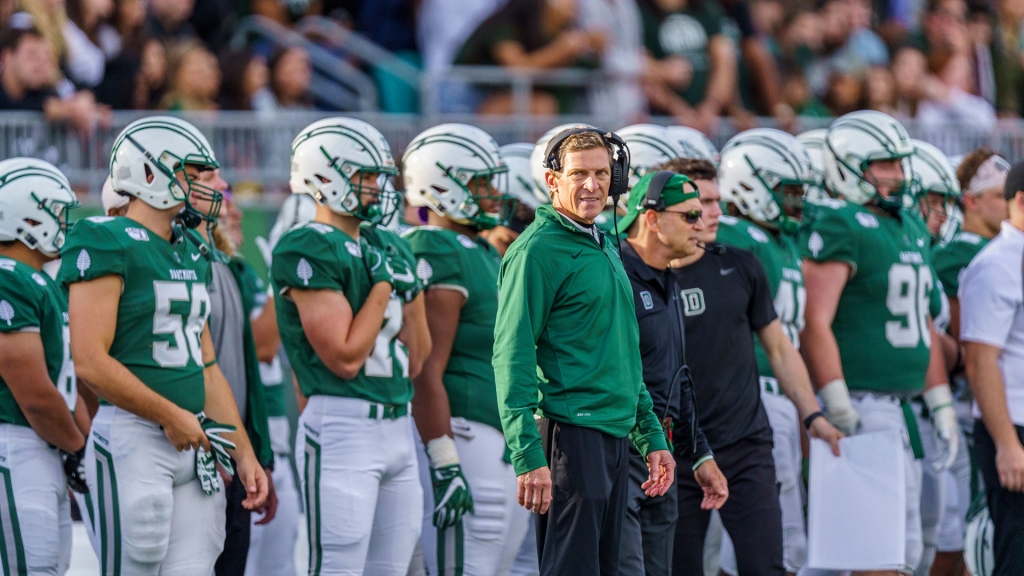Eugene F. "Buddy" Teevens '79, the Robert L. Blackman Head Football Coach, died today, following injuries from a bicycle accident in March. He was 66.
"Our family is heartbroken to inform you that our beloved 'coach' has peacefully passed away surrounded by family. Unfortunately, the injuries he sustained proved too challenging for even him to overcome," the Teevens family said in a statement. "Throughout this journey, we consistently relayed the thoughts, memories, and love sent his way. Your kindness and letters of encouragement did not go unnoticed and were greatly appreciated by both Buddy and our family."
"We are confident and take comfort in the fact that he passed away knowing how much he was loved and admired."
"This is tragic news for Dartmouth and the entire football world," President Sian Leah Beilock and Mike Harrity, the Haldeman Family Director of Athletics and Recreation, said in an email tonight to the Dartmouth community. "Buddy not only was synonymous with Dartmouth football, he was a beloved coach and an innovative, inspirational leader who helped shape the lives of generations of students."
"Buddy's wife, Kirsten Teevens, their children Lindsay and Buddy Jr., and their four grandchildren are in our thoughts and have our deepest sympathy," they added, noting that the longtime football coach had welcomed them both to campus with warmth and enthusiasm when their appointments were announced last year. "We know the greater Dartmouth athletic family will join the Teevens family in mourning the loss of this vibrant, energetic, visionary man."
Harrity and Interim Head Coach Sammy McCorkle gathered the football team after practice this evening to let them know about Teevens' death and to ensure that they have the support and resources they need as they process such devastating news.
Teevens was injured in March when his bike was struck by a pickup truck in Florida. In updates about his condition, Kirsten Teevens had said her husband's right leg was amputated after the accident and that he had also suffered spinal cord injuries. This summer she said they had moved to Boston to continue his rehabilitation and be closer to family and friends.

Buddy Teevens '79 was honored as the New England Coach of the Year three times and was also known for his practice methods to protect players from concussions.
Teevens was an Ivy League Player of the Year as quarterback at Dartmouth and later became the football program's winningest coach.
And he was also known nationally for his practice methods to protect players from concussions.
The former history major worked to reduce full-contact practices by focusing on technique, leading to the development at Dartmouth's Thayer School of Engineering of the Mobile Virtual Player, a robotic tackling dummy that has also been used by other college programs and NFL teams.
"He's proving we can change football, make it safer, work within the system," Chris Nowinski, a founder of the Concussion Legacy Foundation, told the New York Times in 2018.
Teevens was also part of the Manning Passing Academy for 25 years, and through the camp in 2018 wound up hiring Callie Brownson at Dartmouth, where she became the first full-time female Division I coach in football.
About a month after the accident, NFL Commissioner Roger Goodell recognized Teevens at the NFL draft, saying, "His impact both on college football and the NFL has been enormous. He has been a leader in making our game safer through breakthrough innovations. He is a pioneer in hiring female coaches, two of whom are currently coaching in the NFL."
And last week, the eight Ivy League football teams announced they were going to wear a decal with his initials on their helmets this fall to demonstrate their continued support for Teevens, his family, and the Dartmouth community.
Harrity and President Beilock said the football team will play this weekend as Teevens would have wanted, hosting Lehigh on Saturday at Memorial Field at 1:30 p.m. There will be a moment of silence prior to the game and a gathering of remembrance afterward. Dartmouth also plans to honor his legacy in the coming weeks and months with input from the Teevens family.
While a student at Dartmouth, Teevens was named Ivy League Player of the Year in 1978, when he led the Big Green to the Ivy League title. He also lettered in hockey, helping take Dartmouth to a third-place finish at the 1979 NCAA championship. He was voted the Alfred W. Watson Trophy as Dartmouth’s outstanding athlete.

Buddy Teevens '79 was an Ivy League player of the year as quarterback and also lettered in hockey. (Photo courtesy of Dartmouth Athletics)
A head football coach for more than 30 years, including 22 seasons at Dartmouth, Teevens, after two years at Maine, first coached the Big Green from 1987 through 1991, sharing the Ivy League title in 1990 and winning it outright the following year.
After coaching at Tulane and Stanford, he returned to Dartmouth in 2005 and led the team to a share of the Ivy League crown in 2015, 2019, and 2021.
While at Dartmouth, Teevens was honored as the New England Coach of the Year three times, in 1990, 2015, and 2019, and Ivy League Coach of the Year in 2019 and 2021.
All told, his record as Dartmouth head coach was 117-101-2, including 83-70-1 in Ivy League play.
A native of Pembroke, Mass., Teevens grew up in an athletic Dartmouth family. His father, the late Eugene F. Teevens II '52, played hockey at Dartmouth, and his brother Shaun '82 played football and hockey. His sister Moira '87 was captain of the cross country and track teams and garnered All-Ivy and All-East recognition as a runner.
—
Students, faculty, and staff who wish to talk with a counselor are encouraged to do so. Students can call the Counseling Center at 603-646-9442.
Faculty and staff can call the Faculty/Employee Assistance Program at 844-216-8308.
